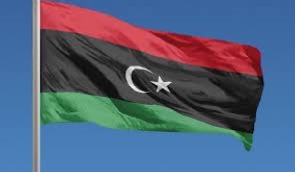 National flag of the Libyan Arab Jamahiriya
National flag of the Libyan Arab Jamahiriya
Libya’s prime minister-designate has submitted a proposed government lineup to parliament for approval, his office said, a key step towards unifying the country that descended into chaos after long-term leader Muammar Gaddafi was removed in 2011.
“In accordance with the roadmap of the political agreement, [Prime Minister Abdul Hamid Dbeibah] handed over to the speaker of elected parliament his proposals for ministerial portfolios,” his office said in a statement on Thursday.
Dbeibah was selected in early February in a United Nations-sponsored inter-Libyan dialogue, the latest internationally backed bid to salvage the country from a decade of conflict and fragmented politics.
A significant oil producer, the North African country has been mired in chaos since the 2011-NATO backed uprising against Gaddafi.
Since 2015, it has been divided between two rival administrations: The UN-recognised Government of National Accord (GNA) in Tripoli and the House of Representatives (HOR) in the eastern city of Tobruk.
Names in Dbeibah’s proposed government were not made public, but the House of Representatives is slated to vote on the list on Monday in the central coastal city of Sirte, located roughly halfway between the two rival administrations.
Under the UN plan, the prime minister has until March 19 to win approval for a cabinet, before tackling the giant task of unifying Libya’s proliferating institutions and leading the transition up to December 24 polls.
Daunting challenges
Dbeibah, a billionaire from the western city of Misrata, had already sent to parliament his “structure and a working vision of a national unity government”, but had not provided names.
If approved, a new cabinet would replace a Tripoli-based Government of National Accord (GNA), set up in 2016 and headed by Fayez al-Sarraj, and a parallel administration in eastern Libya backed by military strongman Khalifa Haftar.
An interim three-member presidency council – selected alongside Dbeibah – is to head the unity administration.
It faces the daunting challenge of addressing the grievances of ordinary Libyans, hit by a dire economic crisis, soaring unemployment, wretched public services and crippling inflation.
The UN’s special envoy for Libya, Jan Kubis, spoke to both Dbeibah and the influential parliamentary speaker Aguila Saleh on Thursday, where he “stressed the importance of moving forward” with the vote of confidence on the cabinet set for March 8.
The political process emerged from the latest bid for peace through the UN effort of the Libyan Political Dialogue Forum (LPDF), launched in Tunisia in November.
But the process has been marred by allegations of vote buying.
They centre on claims in a confidential report by UN experts that at least three participants were offered bribes of hundreds of thousands of dollars in November.
Dbeibah’s administration issued a statement on Tuesday demanding the UN experts publish the report, defending the “integrity of the process through which the new authority was selected”.
Meanwhile, this week an advance team of a UN observer mission flew into the capital, Tripoli, tasked with monitoring a ceasefire between the country’s rival armed factions.
According to the UN, some 20,000 mercenaries and foreign fighters were still in Libya in early December.
A January 23 deadline for their withdrawal passed without any signs of them pulling out.